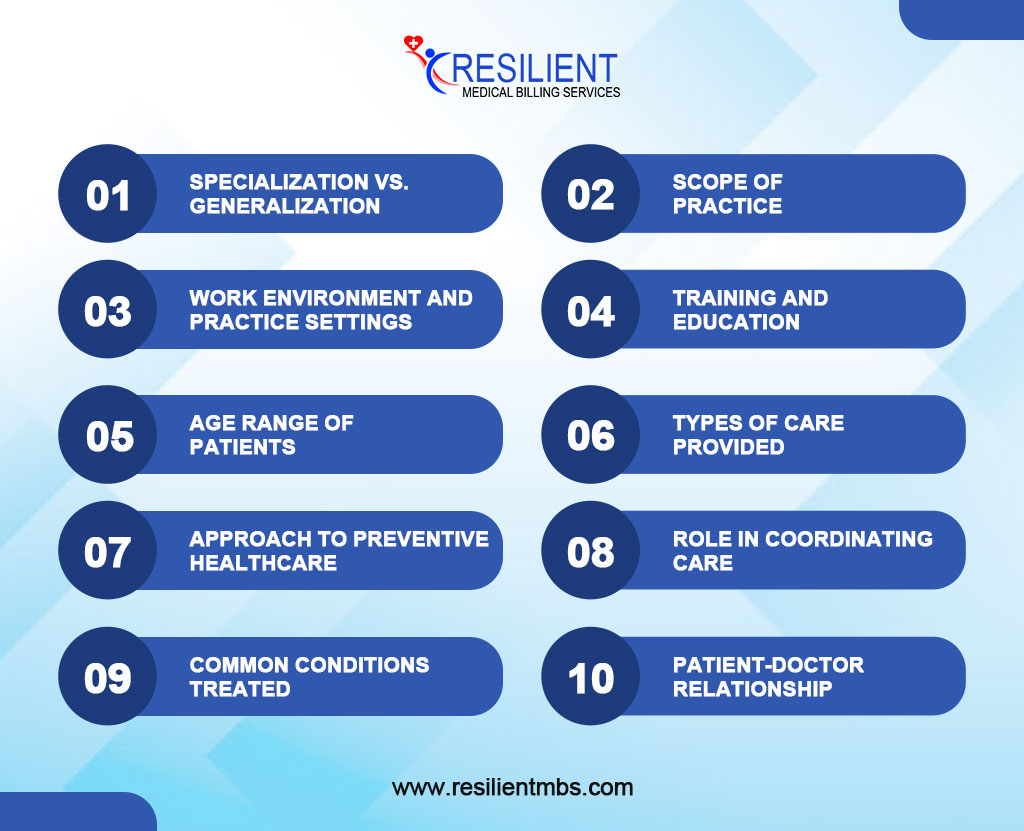Our healthcare system relies on primary care, which maintains us healthy throughout life. Studies suggest that primary care reduces premature deaths by 19% and hospital admissions by 33%. Primary care improves health by preventing diseases and detecting and treating chronic problems. Family medicine vs internal are two primary care specialties that improve your health. But how do you pick the proper one? We are here to talk and elaborate about both internal medicine vs family practice.
This blog will compare the difference between Family and Internal Medicine to help you choose the right specialty for your healthcare journey. Come explore!

1. Specialization vs. Generalization
Family doctors are generalists who handle all ages and diseases. They treat children, adults, and the elderly, making them the go-to doctors for many medical issues. Family doctors treat anything from minor accidents and checkups to chronic diseases throughout life. Their adaptability allows them to treat several health conditions in one visit, providing family-wide treatment.
In contrast to family vs Internal medicine, internal medicine utilizes a more specialized approach. Internists specialize in identifying and treating heart, lung, kidney, liver, and digestive system disorders in adults. They specialise in controlling complicated and multi-system disorders and treat chronic conditions and specialised health difficulties. Internal medicine concentrates on adult health, internal organ function, and illness management, while family medicine provides a broad range of services.
2. Scope of Practice
Family Medicine provides comprehensive treatment to infants to the elderly. Family doctors address a variety of medical ailments and provide preventive care like immunizations, health screenings, and routine checkups. Doctors in this specialization focus on long-term relationships with patients and their families to understand their medical history, family dynamics, and health requirements.
Internal medicine, on the other hand, treats individuals 18 and older. Internal medicine professionals, or internists, diagnose and treat complex adult diseases and chronic ailments. Internists treat heart disease, diabetes, hypertension, and respiratory illnesses, as well as more complex or multi-system diseases that require interior body system knowledge.
3. Work Environment and Practice Settings
Family medicine practitioners work at neighborhood clinics, family practices, and hospitals. Their practice focuses on varied patients and age groups. Family medicine providers’ flexibility in treating a variety of health issues makes them excellent for anyone seeking a one-stop healthcare solution.
Adult-focused hospitals, clinics, and private practices employ internal medicine physicians. Their work environment is more focused on managing adult health, particularly those with complex conditions like diabetes, hypertension, and heart disease. They provide normal care but specialize in diagnosing and treating adult-specific diseases, typically with experts for more serious health conditions.
4. Training and Education
Family doctors have extensive training to treat all ages. They studied pediatrics, obstetrics, geriatrics, and other areas. Family doctors’ broad training allows them to provide prenatal, well-child, and elder care. All ages and conditions can see family doctors for common and complex health issues.
Adult-specific training is given to internal medicine practitioners. They treat severe, chronic, and multi-system adult illnesses during residency. Internists commonly sub-specialize in cardiology, gastrointestinal, or endocrinology after this training. Thus, internal medicine professionals specialize in diagnosing and treating complex adult ailments but cannot treat children, infants, or pregnancies.
5. Age Range of Patients
Family medicine treats patients of all ages, a hallmark. Family medicine practitioners treat children and adults, typically seeing entire families for diverse health needs. This allows a family to have one primary care practitioner for childhood and geriatric care. Family medicine doctors monitor health throughout generations by building long-term ties with patients.
However, family vs internal medicine, internal medicine focuses on adults from 18 to later adulthood. Internists diagnose and treat adult diseases and may handle complex health challenges. Family medicine provides a larger range of care, but internal medicine focuses on adult health.
If You Want Physician Billing Services?
Contact us and Our Team will Assist You6. Type of Care Provided
Family doctors provide preventative care, routine checkups, vaccines, and chronic disease management. They can handle everything from childhood vaccines to chronic diseases like diabetes and heart disease in adults and seniors. Family medicine professionals provide continuity of care for entire families as the initial point of contact for general healthcare.
Internal medicine professionals, or internists, diagnose and treat chronic ailments in adults. They treat complex multi-system disorders, including heart disease, diabetes, and hypertension. Internists excel in treating patients with many chronic diseases who need specialized treatment.
7. Approach to Preventive Healthcare
Family medicine emphasizes preventive care and long-term connections. Family physicians can advise patients on nutrition, exercise, and wellbeing throughout their lives using this method. Family doctors provide tests, vaccines, and lifestyle recommendations to prevent disease.
Internal medicine still emphasizes preventive treatment, but for adults. Internal medicine doctors focus on preventing adult chronic diseases such cardiovascular disease, diabetes, and cancer. Internists can tailor preventative care to a patient’s health risks and family history. Adult health needs are addressed in a more specialized manner.
8. Role in Coordinating Care
Family doctors coordinate patients’ healthcare. Family doctors monitor the health of the entire family to meet their medical needs since they treat patients of all ages. They coordinate treatment by sending patients to experts, monitoring follow-ups, and addressing any health issues. This central coordination enables patients to receive comprehensive care across health areas and life stages.
Adults with chronic or complex health issues are the main focus of internal medicine. Internists treat adults, but they often send them to specialists for more specialized disorders. An internist may send a patient with a heart issue to a cardiologist or a rare disease to a specialist. Internists manage most adult health, however they may collaborate with other specialists for more specific therapies.
9. Common Conditions Treated
Family medicine treats everything from mild infections to chronic disorders. Family doctors handle colds, flu, injuries, and chronic illnesses like diabetes, hypertension, asthma, and arthritis.
Internal medicine cares for persistent and complex adult illnesses. Internal medicine doctors address heart disease, diabetes, hypertension, respiratory disorders, kidney problems, and their long-term repercussions. They provide more in-depth care for adults with complex health disorders by treating multi-system diseases that affect several organs.
10. Patient-Doctor Relationship
Family doctors build long-term ties with patients and their families. These doctors provide comprehensive care from children to geriatrics. They understand a family’s medical history, lifestyle, and relationships because they treat numerous generations. Family doctors can tailor care to a patient’s emotional and social needs with this method.
Internal medicine treats adults, especially those with severe or chronic illnesses. Internal medicine professionals and patients focus on health issues rather than familial relationships. Despite long-term interactions with adult patients, internal medicine specialists focus on preventing, diagnosing, and treating adult illnesses. Clinical and specialized interactions handle adult patients’ health needs.
The Bottom Line
Internal and Family medicine provide vital healthcare, but from family vs internal medicine which to choose depends on your requirements and choices. Family medicine is ideal for individuals seeking a broad approach to healthcare that covers all stages of life and considers family dynamics. However, people with chronic or complex diseases benefit from internal medicine. Both family and internal medicine are beneficial in their own way.
Is internal medicine the same as family medicine?
No, family vs internal medicine are not the same. Internal medicine helps people with complicated or long-lasting illnesses get better. Family medicine takes care of people of all ages, even kids, and often includes preventative care and managing the health of the whole family.
Your health depends on choosing the appropriate primary care physician. Consider your healthcare needs, family relationships, and care style when making this selection. If you want reliable, comprehensive treatment, contact Resilient Medical Billing Solutions (MBS) for experienced family vs internal medicine provider selection. Our team is ready to support your healthcare journey with personalized advice and services. Contact us today for more!










